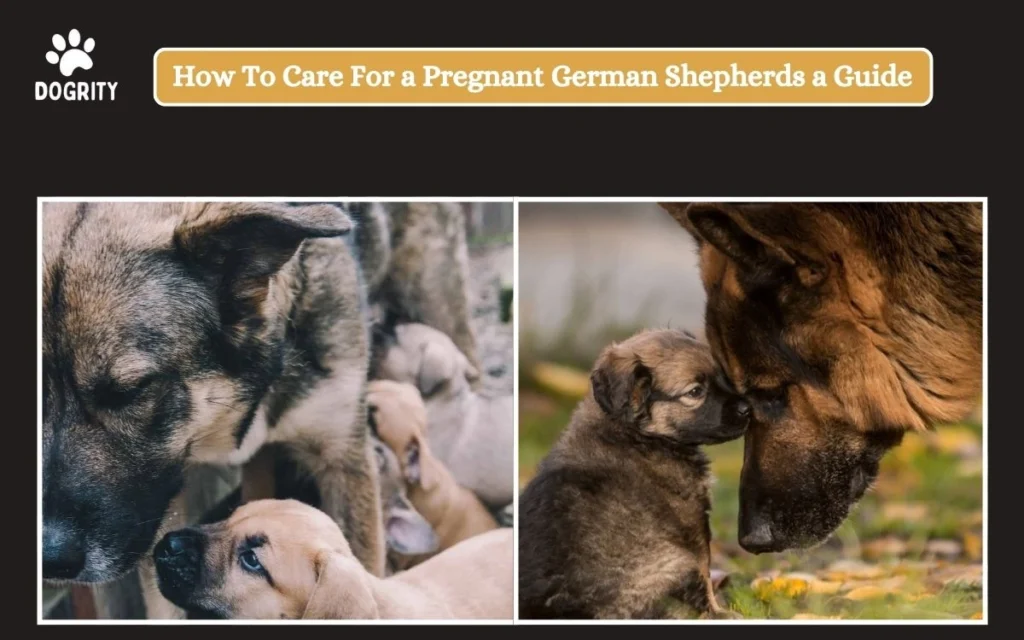How to Care for a Pregnant German Shepherd
German Shepherds are beautiful pets, and being pregnant is an exciting and difficult time for you and your pet. I was both excited and worried when my German Shepherd became pregnant for the first time, and I wasn’t sure where to start. This blog is for anyone in similar situations and is full of tips to help you give your dog the best care possible during this special time.
- How to Care for a Pregnant German Shepherd
- Signs Your Dog Is Pregnant
- What to Do
- Feed Healthy Food
- Visit the Vet Regularly
- Create a Cozy Spot
- Limit Interaction with Other Dogs
- Monitor Temperature and Health
- Stages of German Shepherd Pregnancy
- When Your Dog Gives Birth
- Caring for Newborn Puppies
- Special Considerations for German Shepherds
- FAQ’s
Signs Your Dog Is Pregnant
In order to ensure prompt care, it is necessary that you recognize the first signs of pregnancy. I didn’t even notice until my German Shepherd became a little too uncharacteristically calm and affectionate. The following are the normal warning signs to be aware of:
- Behavioral Changes: Your dog might get too clingy towards you; they will require lots of comfort and attention.
- Physical Symptoms: Look for changes like swollen nipples, a slight weight gain, and a rounder abdomen as the pregnancy progresses. In the later stages, you might even notice movement from the puppies.
- Appetite Changes: In the early weeks, your dog is likely to eat less since she is nauseous much like in the morning. As the pregnancy progresses, her appetite will increase to a significant extent.
It is best to visit a vet if you suspect a pregnancy. To find out how far along your dog is, a professional might do a blood test or check an ultrasound.
What to Do
Pregnancy in German Shepherds typically lasts around 58–68 days, and during this time, your role is to ensure she stays healthy, comfortable, and stress-free. Here are the steps I followed when caring for my pregnant dog:
Feed Healthy Food
A pregnant German Shepherd needs a diet rich in nutrients to sustain her and her puppies. I introduced my dog to high-quality dog food formulated for pregnant or active breeds, since these are rich in protein, calcium, and other vital nutrients.
During the later stages, I found my dog to be eating much more than usual. This is normal, but one should not overfeed her as it may cause obesity, which can cause complications during labor. Always ask your vet for the right portion sizes and whether supplements such as folic acid are needed.
Visit the Vet Regularly
Regular veterinary checkups are crucial during pregnancy. Your vet can confirm how many puppies to expect, check for any potential health issues, and give advice on managing labor. My vet gave me a detailed week-by-week guide, which really helped me track my dog’s progress.
Create a Cozy Spot
Pregnant dogs need to have somewhere safe, quiet, and comfortable where they can lie. I placed the whelping box in a quiet corner of my house, away from distractions and other pets. It was a place where she became comfortable and secure. Ensure the area is warm, well-padded, and easy to clean.
Limit Interaction with Other Dogs
Pregnant dogs get more territorial and less accommodating to others. I removed my other pets from her vicinity later in the pregnancy. I also avoided the possible injury and illness that a pregnant animal may suffer during this phase.
Monitor Temperature and Health
The final week will require you to monitor the temperature of your dog, which is quite essential because a drop of temperature from 100°F generally indicates onset of labor in the subsequent 24 hours. Keep an eye out for other symptoms of labor, like nesting behavior or restlessness.
Stages of German Shepherd Pregnancy
Understanding the stages of pregnancy can help you prepare:
Weeks 1–3
Early development stage. Your dog might not show many signs, but you may notice slight behavioral changes.
Weeks 4–6
Mid-pregnancy. This is when physical changes, like a rounder belly and increased appetite, become more noticeable.
Weeks 7–9
Final stage. Your dog will rest more and may start nesting. You’ll notice significant weight gain and visible puppy movement.
When Your Dog Gives Birth
The birthing process, or whelping, can be nerve-wracking but also rewarding. I stayed close to my dog during labor to provide support without interfering. Signs that labor is near include:
- Restlessness or pacing
- Scratching or digging (nesting behavior)
- Refusing food
- Heavy panting or trembling
During delivery, most dogs manage on their own, but you should be ready to assist if needed. Keep the vet’s contact information handy in case of complications, like prolonged labor or difficulty delivering puppies.
Caring for Newborn Puppies
Once the puppies arrive, the job is not over yet! The first few weeks are all about development. Here’s what I learned:
Provide Warmth
Newborn puppies are unable to regulate their body temperature, so they need to stay warm. I used a heat lamp placed safely above the whelping box, ensuring the area stayed at an ideal temperature.
Monitor Nursing
Make sure all puppies are nursing properly. If one or more puppies struggle to latch, you may need to bottle-feed them with vet-recommended puppy formula.
Help with Hygiene
Puppies and their mother need a clean environment. Regularly change the bedding in the whelping box and ensure the area is free of waste.
Adjust Care as They Grow
At around 3–4 weeks, puppies will begin transitioning to solid food. Introduce puppy food gradually, mixing it with water or formula to create a mushy consistency.
Special Considerations for German Shepherds
German Shepherds are active, intelligent dogs that require special care during pregnancy. Here are a few tips specific to this breed:
- Exercise Needs: Keep exercise light and controlled. Short walks are ideal to keep her active without overexertion.
- Grooming: Regular grooming keeps her comfortable as her body changes. I brushed my dog more often during her pregnancy to reduce shedding and keep her coat healthy.
- Mental Stimulation: Even though physical activity has decreased, mental stimulation should be maintained.
Pregnancy in German Shepherds is a beautiful journey, but it does require effort and commitment. By understanding her needs and providing the right care, you can ensure a healthy pregnancy and delivery for both your dog and her puppies. If you’re preparing for your dog’s pregnancy, I hope this guide helps make the process smoother and more enjoyable. Let me know how it goes, I’d love to hear your experience!







